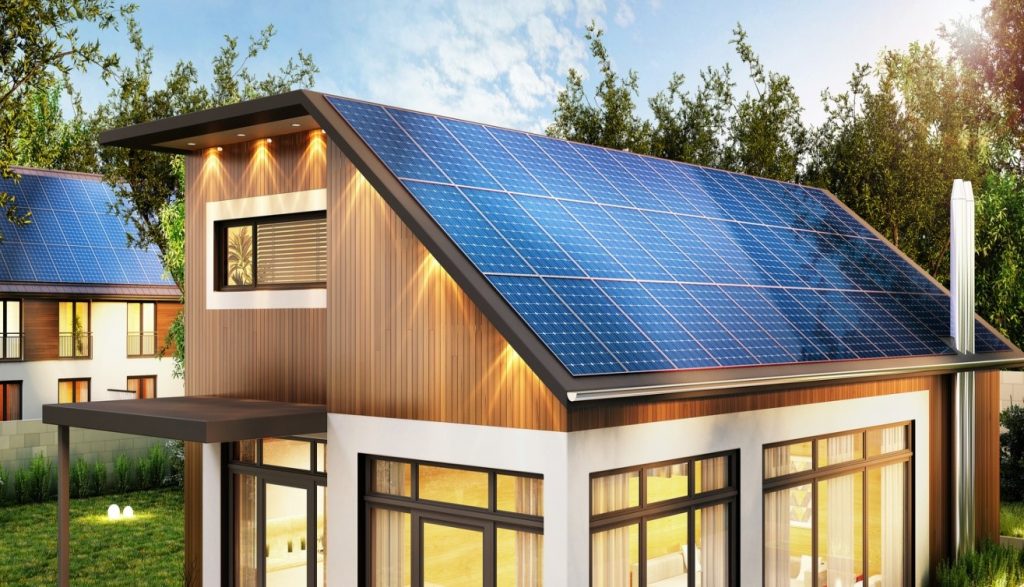Solar power has been gaining real traction in the last several years. Once so expensive that it was hardly any competition for the fossil fuel industry, solar power is now cheaper than coal.
This means that both commercial interests and residential homeowners have been jumping on the bandwagon to utilize energy from the sun.
There are a lot of benefits to installing solar panels, including both environmental and economic advantages.
Are you considering getting solar panels in Illinois but need to do some research first? Let’s take a look at everything you need to know about going solar.
Page Contents
Installing Solar Panels in Illinois Can Come With a Number of Incentives, Tax Credits, and Rebates
When you are deciding whether or not installing solar panels is right for you, you’ll want to take into account the incentives, tax credits, and rebates that might be available to you.
First, there is the Federal Solar Investment Tax Credit (ITC), which is a federal tax credit to the tune of 26%. It is available for home solar systems that were purchased and installed by December 31, 2022.
You can also receive compensation in the form of Solar Renewable Energy Credits (SRECs) when you produce excess electricity. This means you can be compensated per kilowatt-hour that your system produces.
There is also a property tax exemption for the additional home value you receive from installing your rooftop solar system.
Often, you can find additional local and state incentives for installing solar panels on your home. This means that the purchase and install costs can be significantly offset.
The Price of Solar Panels in Illinois Has Fallen in the Last 5 Years
In the last five years, prices for purchase and installation have fallen 45% in the state of Illinois. This means that it’s more affordable than ever to make the switch to solar energy.
To help you find a company that installs solar panels in your area, do a quick Google search of “solar company near me.”
Illinois Has a Renewable Portfolio Standard
Illinois is one of 38 states (plus D.C.) that has a renewable portfolio standard. What that means is that utility companies are required to source a specific amount of their generated energy from renewable resources like solar and wind.
The Costs of a Residential System
When you are determining how much a residential solar energy system will cost you, there are a number of factors that will impact the cost. Some of these include how much energy you will use and the size of your home.
In general, according to the Center for Sustainable Energy, it costs homeowners between $15,000 and $25,000 to install a system on average. However, this does not take into account the rebates, incentives, and tax credits that you can take advantage of.
Is Illinois Too Far North For Solar?
Many people assume that you must live in an endlessly sunny place in order to make solar panels worth the cost. However, you don’t necessarily need to live in California or Arizona in order to produce your own energy from the sun.
In fact, two of the top 10 states that have embraced solar power are Massachusetts and New York.
The more peak sun hours that solar panels receive, the more electricity they will be able to produce. Of course, the sunnier of a place you live in, the better. However, solar panels only need four peak sun hours in order to produce an amount of energy that is useful.
Peoria, Illinois receives between 4.3 and 4.4 peak sun hours a day on average. This means that installing solar panels can still be a viable option as far north as Illinois.
Solar Doesn’t Have to Mean You’re Off-Grid
When you are installing solar panels on your home, this doesn’t necessarily mean that you have to have an off-grid system. A lot of homes that have solar energy systems are still connected to the grid.
You can, however, choose to install an off-grid system. With this type of system, you will have batteries that can store access energy. That way, you will be able to power the systems in your home even when the sun is not shining.
Net Metering Helps You Not Waste Electricity and Save Money
If your panels produce more energy than your house needs, not energy doesn’t need to go to waste. This energy can be fed back into your city’s grid and you can receive a credit on your electricity bill. If your system is off grid, then the access energy will go into your battery storage so you can call upon it later on.
Solar Panels Can Reduce or Eliminate Your Electricity Bill
While there are upfront costs to installing solar panels, once they are in operation they can eliminate or significantly reduce your electricity bill. How much money you will save depends on factors such as your total energy use and the size of your system.
In general, it is said that you can expect to save $1000 or more every year that you use solar panels.
You Will Need a Roof Inspection Before Installation
One thing you will want to think about right away if you are considering installing solar panels in Illinois or anywhere in the country is the state of your roof.
It is important that your roof is in good condition when you install solar panels. If it isn’t, you’ll want to take care of any renovations ahead of time.
You will need to get a roof inspection to make sure that your roof will be able to hold the weight of solar panels. This is particularly true if you’re due for a roof replacement within the next 5 years or so.
It’s a good idea to check into the warranty on your roof even if it was recently installed. This is because you don’t want your warranty to be impacted by the installation of solar panels.
Solar Can Help Increase the Value of Your Home
There is a good chance that installing solar panels on your home can help to increase the value of the property. This means that installing solar panels can still be a financially viable option even if you are planning on moving to a different home down the line.
One recent study found that homebuyers you solar panels as an upgrade just as they would a finished basement or a renovated kitchen. Across the country, homebuyers have been willing to pay roughly $15,000 more for houses that have average-sized solar systems installed.
There is also some evidence to suggest that houses that have solar arrays sell more quickly than those without them.
Going Solar Means You’re Helping the Environment, But It Isn’t All Squeaky Clean
When you produce your own energy from the sun and means that you are not relying on nonrenewable resources. Nonrenewable resources like coal, natural gas, and petroleum, cannot be replaced quickly enough at the rate we use them. This means that our reliance on these nonrenewable resources will end one day, whether it is by choice or by force.
On the other hand, solar energy is a renewable resource. This means that we won’t run out of it and therefore are not taking away from future generations by meeting our own needs today.
Solar energy systems also don’t produce greenhouse gases or air pollution. This means that you can help reduce pollution both locally and globally when you join the growing number of people who are going solar.
To be fair, though, there are some toxic chemicals and materials used to make solar panels. In particular, they are used to make the photovoltaic cells that are the component that make electricity from sunlight. There are some solar thermal systems that transfer heat using potentially hazardous fluids.
If these materials were to leak, they could be harmful to the environment. There are laws in the U.S. that regulate how these chemicals and materials are used and disposed of in order to mitigate any potential damage to the environment.
Additionally, the construction of large solar power plants impacts the immediate environment of their location much in the same way that any type of power plant does. Land often has to be cleared in order to install these solar fields which can negatively impact native animals and plants. Solar power plants that are installed in arid climates might utilize a large amount of the groundwater for cleaning panels in a way that depletes the water source for nearby ecosystems.
Solar Panels in Illinois: Is It the Right Choice For You?
Installing solar panels can be a major investment, but many homeowners are finding that it was worth the upfront cost. As solar energy installation becomes more affordable and more residential homes are equipped with this technology, it’s easy to see that the future might just be powered by the sun.
Did you find this article on solar panels in Illinois interesting? If so, be sure to check out the rest of our blog for more fascinating and informative content!

